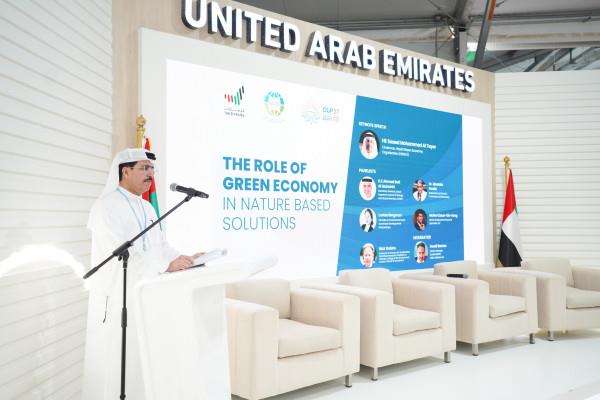(MENAFN- Emirates News Agency (WAM)) sharm el sheikh, 16th november, 2022 (wam) – Saeed Mohammed Al Tayer, Chairman of the World Green Economy Organization (WGEO), highlighted how the organization is promoting effective discussions on nature-based solutions and its impact on climate action during an engagement with stakeholders, at COP27, held from November 6 to 18, 2022, at Sharm El Sheikh, Egypt.
Co-hosted by UNFCCC - WGEO and HSBC Middle East, the session titled 'The Role of Green Economy in Nature-based Solutions,' featured a series of multistakeholder dialogues exploring the role biodiversity plays in the protection of humankind and the financing required to protect both the preservation of Nature and people.
Al Tayer emphasized how nature-based solutions or processes could significantly minimise climate change and its effects while also addressing the regional challenges, such as air, water, and soil pollution, as well as stressed on the value of social inclusion, the role of international collaboration, social innovation, and the private sector in advancing the development of nature-based solutions.
Al Tayer delivered the opening remarks for the session. The session was moderated by David Ramos – Senior Sustainability Manager, HSBC Bank Middle East; along with other prominent members including Hussein Makhlouf, local Administration and Environment Minister of the Syrian Arab Republic, Ahmed Buti Al Muhairbi, Secretary-General of the Dubai Supreme Council of Energy, Dr. Mostafa Foda – National Focal Point for Convention of Biodiversity in Egypt, Waleed Salman, Vice Chairman of WGEO and Abdulrahim Sultan, Director-General of WGEO.
Al Tayer, in his speech said:“The world is witnessing major crises across all sectors due to climate change, which has caused natural disasters in various regions worldwide. Europe experienced its worst drought in at least 500 years, shrinking water levels in key rivers. One third of Pakistan was completely and deeply flooded with rainwater bringing widespread destruction and misery. The Sixth Assessment Report of the Intergovernmental Panel on Climate Change indicates that climate change will impact water quality and availability. Globally, 800 million to 3 billion people are projected to experience chronic water scarcity due to droughts at 2°C warming. This calls for climate action at all levels, to protect economies, livelihoods, and ecosystems.”
Al Tayer further stated,“What is needed today is solutions that address several challenges at once. Transitioning to a green economy as well as resorting to nature-based solutions will contribute to enhancing food and water security, address climate change and biodiversity loss, and strengthen the response to disasters. Climate-smart agriculture, forestation, and natural ecosystems restoration are multi-faceted, serving the economy, people and the climate response. Platforms like COP 27 not only allow global stakeholders to have their voices heard, but also provide a forum to address climate change, share best practices and build commitments. Most significantly, such platforms make sure that all stakeholders are fully committed to and involved in all measures intended to curtail climate change. This will help the society and wildlife in successfully adapting and ensure preservation of the ecosystem on planet Earth.”
“The UAE attaches great importance to adopting the principles and practices of green economy to achieve sustainable development and combat the repercussions of climate change. The UAE is leading this effort by setting a framework for achieving net-zero emissions, launching green initiatives, and ambitious national strategies and policies that will help reduce carbon emissions and adapt to climate change, as well as find a smooth path towards achieving economic prosperity that goes in parallel with environmental sustainability. To support the Dubai Clean Energy Strategy 2050 and the Dubai Net Zero Carbon Emissions Strategy 2050 to provide 100% of the total power production capacity from clean energy sources by 2050, Dubai launched major strategic initiatives and development projects.
These projects, built through Dubai Electricity and Water Authority (DEWA), include the Mohammed bin Rashid Al Maktoum Solar Park, the world's largest single-site solar park using the Independent Power Producer (IPP) model with a production capacity of 5,000 megawatts by 2030; the pumped-storage hydroelectric power plant in Hatta using clean energy, which is the first of its kind in the GCC region; and the Green Hydrogen project that DEWA implemented at the Mohammed bin Rashid Al Maktoum Solar Park in Dubai. It is the first pilot project of its kind in the Middle East and North Africa for green hydrogen production”, Al Tayer said.
Al Tayer also emphasised the importance of nature-based solutions to enhance food and water security, address climate change and biodiversity loss, and strengthen the response to disasters, as well as how the UAE places strong focus on transitioning to a green economy.
“Bridging these elements is also a priority, to make the implementation process as efficient, and effective as possible. Advancing the green economy requires international cooperation, guaranteeing a new approach and a stable partnership among all stakeholders globally. In this respect, the UAE government, along with WGEO, have launched the Global Alliance on Green Economy in September 2022, aiming to advance policymaking and implementation towards a green economy, at the global, regional, and national levels. Solutions under the Alliance will address the transition, climate change and sustainable development. Today's session at COP 27, among others, will bring us closer to making such solutions available and accessible and lead us towards achieving our shared ambitions to combat the harmful effects of climate change, and support cooperation initiatives to help the world achieve future sustainability through the transition to a green economy”, Al Tayer concluded.

.gif)

















Comments
No comment